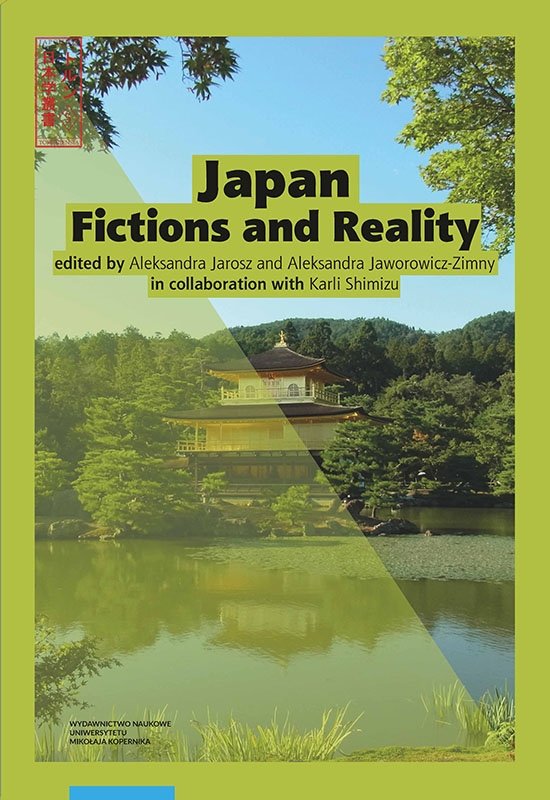Japan: Fictions and Reality
edited by Aleksandra Jarosz and Aleksandra Jaworowicz-Zimny
in collaboration with Karli Shimizu
“Japan is a country with no minorities.” “Japanese society is the most homogenous in the world.” “Japan is the most religiously tolerant country in the world.” “The Japanese are always subservient and polite.” “The Japanese have no sense of humor.” Are these fiction or reality? We cannot guarantee you any firm answers. We can, however, assure you that each of the 28 chapters of this volume should bring you closer to an understanding of the reality of Japan at the turn of Reiwa.
„W Japonii nie ma mniejszości.” „Japonia ma najbardziej jednolite społeczeństwo na świecie.” „Japonia to kraj o największej na świecie tolerancji religijnej.” „Japończycy są zawsze usłużni i grzeczni.” „Japończycy nie mają poczucia humoru.” Fikcja czy rzeczywistość? Choć nie możemy zaproponować Czytelnikom oczywistych odpowiedzi, zapewniamy, że każdy z 28 rozdziałów niniejszego zbioru przybliży Ich do zrozumienia rzeczywistości Japonii u progu ery Reiwa.
Tom V z serii Japonica Toruniensis
ALEKSANDRA JAROSZ, ALEKSANDRA JAWOROWICZ-ZIMNY
Introduction / 9
Chapter 1
Literature / 23
ANNA ZALEWSKA
Waka poetry as a playground for words. About mono-no na poems and strategies of translating them / 25
ANDRZEJ ŚWIRKOWSKI
Into a panoramic fantasy: On Edogawa Rampo’s Panoramatō Kidan / 43
VERONIKA ABBASOVÁ
My brother, my lover, my god: the queer relationship in Yasunari Kawabata’s Shōnen / 65
KATARZYNA SONNENBERG-MUSIAŁ
In search of the essence of history and literature: Natsume Sōseki’s reading of England’s past / 87
PIYANUCH WIRIYAENAWAT, SUNEERAT NEANCHAROENSUK
村上春樹『我らの時代のフォークロア――高度資本主義前史 ―「世間の普通の流れ」の錯覚―』/ 103
MIKOŁAJ MELANOWICZ
Keiichirō Hirano – a talented Heisei Era writer: the author of a great novel about Chopin / 117
Chapter 2. Language
ARKADIUSZ JABŁOŃSKI
Description of the nominal elements of Japanese: proposition of a synthetic approach / 127
ALEKSANDRA JAROSZ
Basic description of the finite verb inflection in Kurima-Miyako / 141
VÍT ULMAN
The current state of the Tsushima dialect / 173
WOJCIECH GĘSZCZAK
Gendered speech stylization and the multimodality of Japanese popular fiction / 193
GORAN VAAGE
Taboos of storytelling in Japanese: evaluations of funny stories performed in the My Funny Talk Corpus / 209
PATRYCJA DUC-HARADA
Linguistic and sociolinguistic awareness towards Japanese honorifics and politeness strategies of Polish students of Japanese studies / 225
SHŌKO NAKAYAMA
ポーランド語を母語とする日本語学習者の授受表現習得の問題 / 249
ALEKSANDRA WĄSOWICZ-PEINADO
日本語学習者の能動的な漢字能力 ―漢字教育の目標と学習成 果の評価 / 265
Chapter 3. Social studies
MICHELLE LA FAY
The myth of the loss of Japanese identity and its manifestations / 281
AO KAMEARI
Kenji Nakagami’s view on the hisabetsu buraku and his creative writing: example of the reportage Kishū / 301
ANNA MARIA DZIENIS
Modern migration in Japan / 319
EWA ALEKSANDRA PŁOCHA
The characteristics of the Japanese criminal process / 337
ALEKSANDRA JAWOROWICZ-ZIMNY
Kamikaze myth as surrogate religion: on the example of manga Jinsei-ni Mayottara Chiran-ni Ike / 353
HAZUKI MORI
The historical significance of the Japanese anti-religious movement in the early 1930s: between “fiction” and “reality” in modern Japanese religion / 375
ALEKSANDRA SKOWRON
The Buddhist concept of “emptiness” in Masao Abe’s dialogue with Christian thinkers: misconceptions and justifiable objections / 389
IVA LAKIĆ PARAĆ
Japanese studies in Croatia: the poetic world of Vladimir Devidé / 407
ALFRED F. MAJEWICZ
Japan in the late Meiji years as seen by Bronisław Piłsudski with remarks concerning the reception of Piłsudski’s legacy appended / 421
Chapter 4. Culture studies
ALEKSANDRA CIEŚLICZKA
Tradition or modernity: Japanese design concept over the centuries and its influence on the image of Japan / 457
GIULIA BAQUÈ, MANUELA COLDESINA
Performing gender in shunga: blurring boundaries between fiction and reality / 475
AGNESE HAIJIMA
Distinctive features of Japanese interior design / 491
MARIA GRAJDIAN
Re-envisioning the sense of self in Japanese popular culture: Studio Ghibli’s 2013 animation movies The Wind Rises and The Tale of Princess Kaguya / 529
KYOHEI ITAKURA
The new relationship between fans and industry: An example of cooperation between French fan group AEUG and Bandai / 551
Selective subject index / 565
Selective person index / 571
日本語索引 / 573
Aleksandra Jarosz
Aleksandra Jaworowicz-Zimny
Powiązane

Polski leksykon japońskich terminów gramatycznych t.1-3
Arkadiusz Jabłoński
Japonia późnych lat okresu Meiji oczyma Bronisława Piłsudskiego
Alfred F. Majewicz
Litteraria Copernicana 2(14)/2014: Japonia
Adam Bednarczyk, Sylwia Kołos, Hanna Ratuszna
W świecie opowieści i snów. Wokół „Pamiętnika z Sarashiny” córki Sugawary Takasuego
Adam BednarczykInne z tej kategorii

(Nie)oczywiste „Ziemie Odzyskane”

Pan Samochodzik i…

Dziady. Rzecz o wędrownych żebrakach i ich pieśniach
Piotr Grochowski






